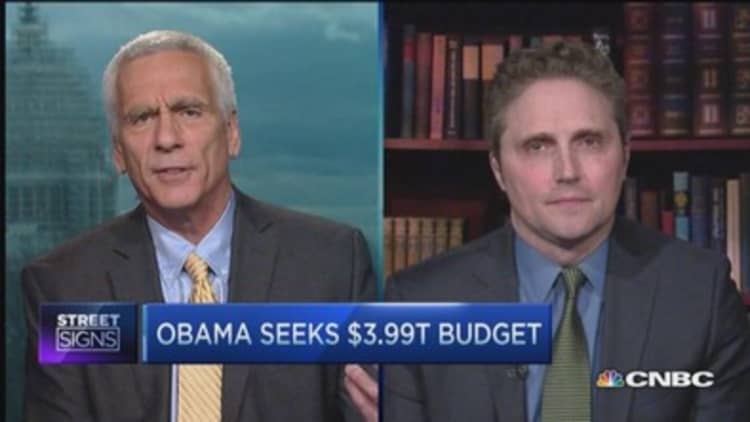The Obama administration wants to win the authority to haggle over the prices of specialty drugs for recipients of Medicare, the massive federal government program that providers health coverage to the elderly.
That request, which seeks to control the often-high costs of such drugs, like the $1,000 per day hepatitis C treatment Sovaldi, came as part of a $1.08 trillion budget submission for the Health and Human Services Department for fiscal 2016.
Read MoreObamacare adds 10.1M to Medicaid
HHS, which had a $1.04 trillion budget for 2015, is also seeking $83.8 billion in discretionary spending, a nearly $5 billion increase over the current fiscal year.
The budget includes a four-year extension of the Children's Health Insurance Program, to be funded with an increase in tobacco taxes, $4.2 billion in spending for centers that provide primary health services to medically underserved and vulnerable populations, and consolidating the Department of Agriculture's Food Safety Inspection Services with the Food and Drug Administration's food safety components to create a single new "food safety agency within HHS."
The budget also "proposes targeted reforms to Medicare and Medicaid that are projected to save more than $400 billion over the next decade," according to HHS. "These reforms will improve the long-term sustainability of Medicare and Medicaid by increasing the efficiency of health-care delivery while enhancing the quality of care for the elderly, children, low-income families and people with disabilities."
The suggestion that HHS have power to negotiate Medicare specialty drug prices did not have a budget savings amount attached to it. That could be a reflection of how unlikely that proposal is to fly with Congress.
Increasing specialty drug costs have been pointed to as one of a handful of inflationary factors that have gone against the trend of an overall slowdown in national health-care spending. About 55 million people receive prescription drug benefits under the Medicare program, but the government currently is barred from negotiating prices of medication.
Read MoreObamacare confusion boosts tax pros: CEO
Spending on Medicare Part D, the area of the program that covers prescription drugs, is projected to grow by 30 percent in 2016, according to the budget proposal. The cost of specialty drugs is one of the factors causing that increase, according to HHS.
Sylvia Burwell, HHS Secretary, said the power she's seeking for her agency is "something that we believe will help with the issue of drug prices."

But Dan Mendelson, CEO of the Avalere Health consultancy, said: "There's a question in my mind about how serious they are about trying to do something on this issue. ... I think in the absence of a lot of specifics it's hard to gauge how meaningful the proposal is."
"If they really wanted to start controlling drug prices, that's a very heavy lift, both with the Congress and with" pharmaceutical companies, Mendelson said. "It's really clear that Congress has not the appetite for the control of drug prices in this country."
Read MoreYou can sell your poop for $13,000 a year: Report
He also said "there's no evidence that the government coming in to negotiate prices will result in a better outcome than asking a pharmacy benefit manager to do it."



